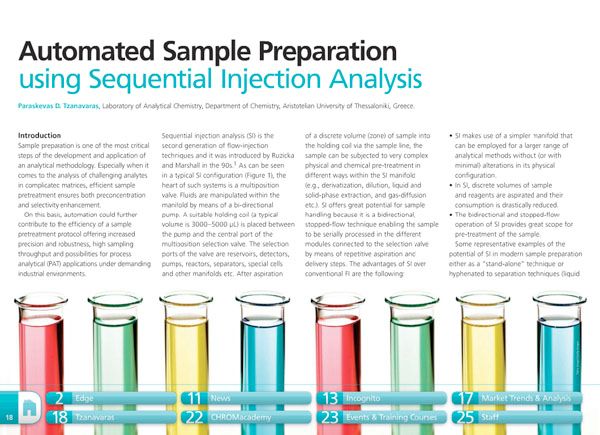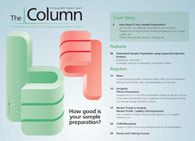Automated Sample Preparation using Sequential Injection Analysis
An introduction to sequential injection analysis as a useful tool for automated sample preparation.
Sample preparation is one of the most critical steps of the development and application of an analytical methodology. Especially when it comes to the analysis of challenging analytes in complicated matrices, efficient sample pretreatment ensures both preconcentration and selectivity enhancement.
On this basis, automation could further contribute to the efficiency of a sample pretreatment protocol offering increased precision and robustness, high sampling throughput and possibilities for process analytical (PAT) applications under demanding industrial environments.
Sequential injection analysis (SI) is the second generation of flow-injection techniques and it was introduced by Ruzicka and Marshall in the 90s.1 As can be seen in a typical SI configuration, the heart of such systems is a multiposition valve. Fluids are manipulated within the manifold by means of a bi-directional pump. A suitable holding coil (a typical volume is 3000–5000 μL) is placed between the pump and the central port of the multiposition selection valve. The selection ports of the valve are reservoirs, detectors, pumps, reactors, separators, special cells and other manifolds etc. After aspiration of a discrete volume (zone) of sample into the holding coil via the sample line, the sample can be subjected to very complex physical and chemical pre-treatment in different ways within the SI manifold (e.g., derivatization, dilution, liquid and solid-phase extraction, and gas-diffusion etc.). SI offers great potential for sample handling because it is a bidirectional, stopped-flow technique enabling the sample to be serially processed in the different modules connected to the selection valve by means of repetitive aspiration and delivery steps.
Study Explores Thin-Film Extraction of Biogenic Amines via HPLC-MS/MS
March 27th 2025Scientists from Tabriz University and the University of Tabriz explored cellulose acetate-UiO-66-COOH as an affordable coating sorbent for thin film extraction of biogenic amines from cheese and alcohol-free beverages using HPLC-MS/MS.
Multi-Step Preparative LC–MS Workflow for Peptide Purification
March 21st 2025This article introduces a multi-step preparative purification workflow for synthetic peptides using liquid chromatography–mass spectrometry (LC–MS). The process involves optimizing separation conditions, scaling-up, fractionating, and confirming purity and recovery, using a single LC–MS system. High purity and recovery rates for synthetic peptides such as parathormone (PTH) are achieved. The method allows efficient purification and accurate confirmation of peptide synthesis and is suitable for handling complex preparative purification tasks.






